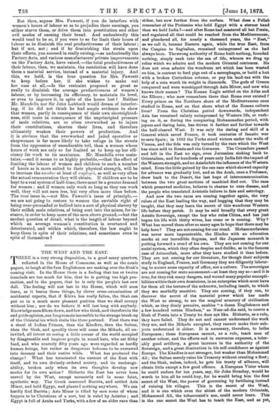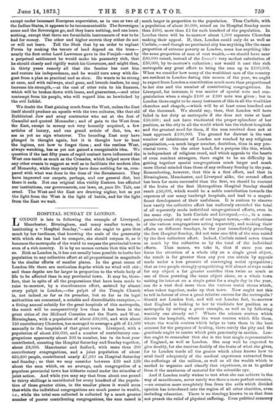THE WEST AND THE EAST.
THERE is a very strong disposition, in a good many quarters, reflected in the House of Commons, as well as the comic papers, to laugh at the fuss Englishmen are making over the Shah's coming visit. In the House there is a feeling that ten or twelve ironclads are too much for him, that he is getting too high pro- motion, and in the papers, that he is only the people's last new doll. The feeling will not last in the House, which will soon learn, as it learns those things, by clever cross-examination of accidental experts, that if Khiva has really fallen, the Shah can put us in a much more pleasant position than we shall occupy without him ; nor do we believe it will last long with anybody. Knowledge soon filters down, and few who think, and therefore in the end guide opinion, can long remain insensible to the strange break-up of the Oriental ice which visits like these portend. First there was a shoal of Indian Princes, then the Khedive, then the Sultan, then the Shah, and speedily there will come the Mikado, all un- invited, all intent on seeing a little corner of the world occupied by disagreeable and impious people in round hats, who eat filthy food, and who scarcely fifty years ago were regarded as hardly human beings, but rather as dangerous baboons to be overawed into decency and their native wilds. What has produced the change? What has terminated the content of the East with itself, and its own divinely-ordered society, and its inichange- ability, broken only when its own thoughts develop new modes for its own action? Hitherto the East has never been moved by the West, except momently and in some faint, apathetic way. The Greek mastered Bactria, and settled Asia Minor, and held Egypt, and planted nothing anywhere. We can hardly find Bactria ; Asia Minor is tilled by men some of whom happen to be Christians of a sort, but is ruled by Asiatics ; and Egypt is full of Arabs and Turks, with a few of an elder race than
either, but now further from the surface. What does a Fellah remember of the Ptolemies who held Egypt with a sterner hand than we hold India 2—and after Rome had mastered all but Persia, and regulated all that could be reached from the Mediterranean, and plundered all, for nearly a thousand years, the "East," as we call it, became Eastern again, while the true East, from the Caspian to Saghalien, remained unimpressed aa she had always been. The strong authority of Rome built nothing, founded nothing, simply sank into the sea of life, whence we drag up relics which we admire and the modern Oriental contemns. He does not even admire the wondrous art which has been wasted on him, is content to feed pigs out of a sarcophagus, or build a hut with a broken Corinthian column, or pay his laud-tax with the help of a coin worth its weight in diamonds. The gods of Greece conquered and were worshipped through Asia Minor, and now who knows their names? The Roman Eagle settled on the Atlas and the Elburz ; who now remembers there that Rome ever existed ? Every prince on the Northern shore of the Mediterranean once studied in Rome, and on that shore what of the Roman culture lives? From the Christian period downwards, independent Asia has remained calmly unimpressed by Western life, or rush- ing on it, as during the conquering Mohammedan period, with joyous and daring hate, has driven it farther and farther towards the half-cleared West. It was only the daring and skill of a General which saved France, it took centuries of fanatic war to save Spain ; in 1683 the Turks stood victors under the walls of Vienna, and the tide was only turned by the race which the West has since sold to Russia and the Germans. The Crusaders passed and left in the East no sign, even Jerusalem sinking back to Orientalism, and for hundreds of years only India felt the impact of the Western strength, and no Asiatic felt the influence of the Western mind. Even the little gained by the one race which showed capacity for advance was gradually lost, and as the Arab, once a Professor, drew back to the Desert, the last hope of intercommunication between the two great sections of mankind died out. The race which preserved medicine, believes in charms to cure disease, and the people who translated Aristotle believe in fate and astrology.
And now the two races are coming together again, the very rulers of the East leading the way, and begging that they may be taught, that they may learn the secret of this wondrous Western life before they perish. It may be said broadly that every great Asiatic Sovereign, except the boy who rules China, and has just begun his life with thirty wives, has come or is coming. Why? What has moved them after so many ages to hope that there may be help here ? They are not coming for our creed. Mohammedanism was never more impenetrable, the Hindoo with an education mocks at our incredible dogmas, and the Japanese monarch is putting forward a creed of his own. They are not coming for our social system, which they often despise and dislike, as in the famous case of Azimoollah, more after they have studied it than before. They are not coming for our literature, for though their subjects study in England, France, and Germany they are diligently labour- ing to secure some capacity of office, not a culture. The sovereigns are not coming for mere amusement—at least they say so—and it is true, for they risk many dangers, and wound many popular suscepti- bilities within their own dominions, in an enterprise which must have for them all the terrors of the unknown, including insult, to which they are morbidly sensitive. They are coming, if they can, to discover the secret of the material power which has made the West so strong, to see the magical armoury of civilisation which, as they dimly' perceive, enables "a dozen Englishmen and a few hundred rotten Hindoos," as Nusr-ed-din said, to coerce a Shah of Persia into a Treaty he does not like. Hitherto, as a rule, they have failed. They do not and cannot understand the work they see, and the Mikado excepted, they cannot make their sub- jects understand it either. It is necessary, therefore, to bribe Europeans ; these Europeans cannot, as a rule, teach men of another colour, and the efforts end in enormous expenses, a toler- ably good artillery, a great increase in the authority of the Sovereign, and a great diminution in his self-confidence as against Europe. The Khedive is not stronger, but weaker than Mohammed Ali ; the Sultan merely ruins his Treasury without creating a fleet ; and the Shah, unless, indeed, he gets his treaty of alliance, will obtain little except a few good officers. A European Vizier whom he could endure for ten years, say, Sir John Strachey, would be worth to him all he could .buy, for he would bring him the first secret of the West, the power of governing by fertilising instead of ruining his villages. This is the secret of the West, and it is one which even the ablest of the modern Orientals, Mohammed Ali, the tobacconist's son, could never learn. This is the one secret the West has to teach the East, and as yet, except under incessant European supervision, as in one or two of the Indian States, it appears to be incommunicable. The Sovereigns come and the Sovereigns go, and they learn nothing, and can learn nothing, except that there are formidable instruments of war to be had for money. The other and higher secrets they either do not or will not learn. Tell the Shah that by an order to replant Persia by making the tenure of land depend on the trees— nearly the first order Lord Lawrence gave in the Punjab—and by a perpetual settlement he would make his peasantry rich, that he should closely and rigidly watch his Governors, and might then, in thirty years remedy all that the famine has cost him and restore his independence, and he would turn away with dis- guat from a plan so practical and so slow. He wants to be strong at once, and with railways, steel guns, and breech-loaders, he may increase his strength,—at the cost of utter ruin to his finances, which will be broken down with loans, and guarantees,—and utter contempt from his people, who will regard him as bewitched by the evil Infidel.
We doubt the East gaining much from the West, unless the East itself should produce an apostle with the two cultures, like that old Rabbinical Jew and army contractor who sat at the feet of Gamaliel and quoted Menander ; and of gain to the West from the East, except in money not very honestly acquired, a few articles of luxury, and one grand article of diet, tea, we see as yet no sign whatever. The brooding East may have plunged in thought again, but it is thought how to beat the legions, not how to forget them ; and the restless West, always watching, has as yet not gained a recognisable idea. We • question if the last fifty years of rapid contact have influenced the West one-tenth as much as the Crusades, which helped more than any other events to suggest as well as to facilitate the modern idea of Monarchy, while they certainly have done nothing for us, com- pared with what was done in the time of the Renaissance. They have improved our carpets, perhaps, and our general diet, but there it ends. Not one original idea visibly Eastern has affected
our institutions, our governments, our laws, or, pace Dr. Tait, our creed. The West and the East are drawing nigher, but as yet the light from the West is the light of battle, and for the light from the East we wait.



































 Previous page
Previous page